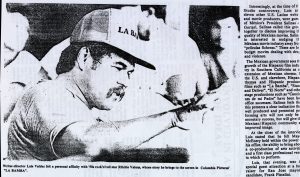But on condition of equal status with main line art groups
March 28, 1990
By Yolanda Reynolds

Luis Valdez’ Teatro Campesino has recently been mentioned in City Council discussions regarding the now abandoned proposal to displace the downtown Studio Theater.
In a March 15 Mercury News editorial entitled, “Boo’s All Around,” it is stated that the city is abandoning its plan to buy the Studio and renovate it for performances of the San Jose Repertory Company and El Teatro Campesino.
As a follow uo of these references to El Teatro Campesino Luis Valdez, of El Teatro, who was in San Jose last Thursday evening, was asked by this reporter about the possibility of El Teatro Campesino coming to San Jose.
Luis confirmed that the Mayor did talk in early January of this year to Luis about the possibility that El Teatro share a theater building with the Repertory Theater.
Luis was, and still is, interested in such a possibility. He feels that such cooperation is desirable because it is in San Jose, as in San Juan Bautista, that the history of a major clash of a variety of cultures took place. Luis says it would be a natural evolution that, in time these same cultures come together to cooperate to “create new works on a number of different levels.”
Luis has offered as much help as is needed to achieve the type of cooperation in the arts, particularly theater, television, and cinema, will result in a medium and fare that reflects the contemporary which, today, is multi ethnic.
Such productions are then a mosaic of the community because; the subject matter of theme of the production, the casting, and the elements of the production such as design costumes and music is reflective of the varied contemporary community.
Cooperation of the sort envisioned by Luis is difficult to achieve. A Little over a year ago, Luis offered a play of his that has been very successful in other major U.S. cities of The Repertory Theater for a co-production but they refused the offer.
As the testimony before the Council, regarding the displacement of the Studio, a representative of the Repertory Theater stated that The Redevelopment Agency had begun attempts at acquiring the Studio for their group 18 months ago. In fact, 18 months ago measurements of the Studio’s stage, seating capacity etc. were taken to assure that the building would meet the Repertory’s needs. Luis and his group were not asked what their needs might be nor El Teatro asked to participate in looking over the building in which the City of San Jose was planning to spend many millions of dollars to renovate for one local stage group, The Repertory Theater, a group that is already supported with a substantial subsidies from the City of San Jose.
Contrary to the sentiment expressed in a recent Mercury News article by Murray Frymer, Luis says that cooperation does not mean merely the representation of a play with a Hispanic theme, or the presence of one actor of Hispanic lineage.
Valdez says that it’s not only the presentation that is necessary but that such plays be a true co-production.
It has been difficult for some policy makers to understand that ethnic communities will not feel satisfaction and equity until when they are partners in the endeavor – what ever that endeavor may be.
For example, in another but related issued, members of the Hispanic community have questioned statements forwarded by the Downtown Working Review Committee (DWRC) to the City Council alluding to the “…lack of compatibility of some of the ethnic businesses with the current direction of downtown” San Jose. While on the other hand, that same DWRC is recommending that the city provide incentives to lure an important shop such as Cost Plus, into the downtown.
The thought is raised as to why an imitation ethnic shop is sought when the city already has many successful ethnic owned and market oriented shops downtown. Consultations with the ethnic community are seldom made a priority, until they are forced by public opinion.
Luis Valdez was born and educated in San Jose. In San Jose he began the Teatro Campesino and performed with his group many years ago in the Montgomery Theater. Valdez says that the Montgomery Theater stage is totally inadequate for more performing arts presentations and has expressed that opinion to the Mayor. He also stated to Mayor McEnery that he did not approve the displacement of the Studio Theater in order to make for the Repertory Theater. Luis said that displacing the Studio was a “bad idea.”
Interestingly, at the time of the Studio controversy, Luis and eleven other U.S. Latino writers and movie producers, were guests of Mexico’s President Salina de Gortari, Salinas called this group together to discuss improving the quality of the Mexican movie industry away from “peliculas ficheras.” These are low budget movies dealing with drug and violence.
The Mexican government sees the growth of the Hispanic film industry in Southern California as an extension of Mexican cinema. In the U.S. and elsewhere, Hispanic produced films such as “La Bamba,” Stand and Deliver,” “El Norte,” and other stage productions such as Canciones de mi Padre” have been box office successes. Salinas feels that his presents a clear indication that well produced and presented performing arts will not only be a monetary success, but will give the Mexican/Hispanic community an improved image.
At the close of the interview, Luis stated that he felt Mayor McEnery held within the power of his office, the ability to bring about a co-production of arts activities and a first class professional venue in which to perform.
Luis was the special guest attraction at a fundraiser for San Jose mayoral candidate, Frank Fiscalini, that evening.
